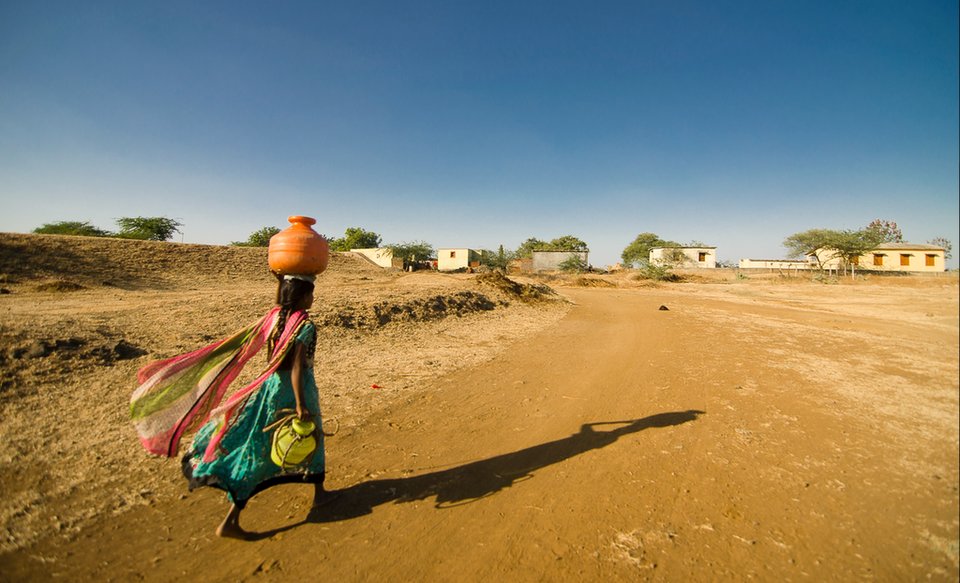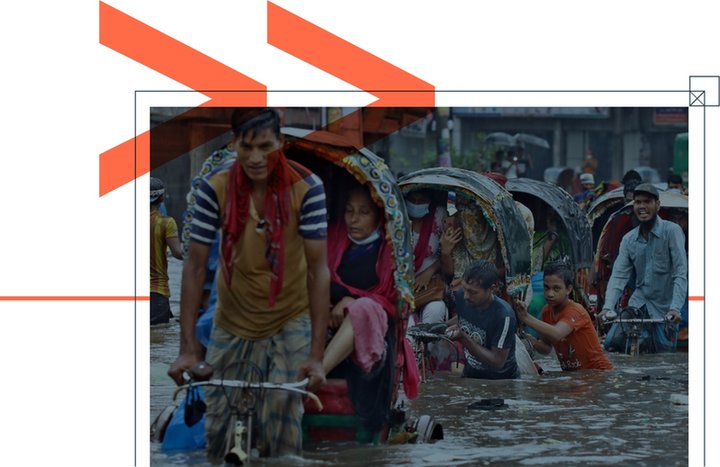Systems change requires collaboration, adaptative learning, and a strong field of partners.
In 2020, that meant strengthening partners through core support and pursuing co-financing and leverage opportunities to amplify our own contributions. At the same time, we also focussed on improving how we work with our partners, particularly by increasing the duration and size of our grants.

Good
design
We fund and co-create initiatives with the right design to not only address systemic challenges, but also strengthen organisations and networks, influence policies, and shape industry narratives.
We fund and co-create initiatives with the right design to not only address systemic challenges, but also strengthen organisations and networks,
influence policies and shape industry narratives.
It means focussing on bigger bets. In 2020, we committed 20% of our annual budget to longer-term and larger grants that gave mission-aligned partners more flexibility and stability. But we have more work to do. Our median grant size of EUR 200,000 and average grant duration of 18.4 months do not yet reflect the long-term commitment we want, and we are working hard to improve on this.
That said, as a new foundation that launched only in January 2020, we have spent our first year experimenting, testing new concepts, and developing relationships with new partners. As we build trust (on both sides), we will make increasingly longer-term strategic grants to these partners.
our response in numbers
MEDIAN Grant Size
Average Grant length
*Center for Effective Philanthropy custom cohort benchmark of Laudes Foundation (formerly C&A Foundation) grantee perception survey, published in 2020.
**Implementing and core support grants above EUR 50K.
Strengthening
organisations and
ecosystems for impact
Core support grants – as opposed to earmarked funding for specific initiatives – give partners the ability to deploy funds wherever they see the need for the most support. It builds strong, viable organisations, which is critical for the larger systems change we aspire to.
Core support grants – as opposed to earmarked funding for specific initiatives – give partners the ability to deploy funds wherever they see the need for the most support. Core funding builds strong, viable organisations, which is critical for the larger systems change we aspire to.
We believe that for it to be most impactful, it must be unrestricted and supported by targeted, non-financial assistance in areas such as strategy, communications and leadership that will ensure our partners’ effectiveness and longevity.
A quarter of the grants we made in 2020 provided core support to our partners and when we add the Covid-19 Emergency Fund, that number increases to 29%. Inspired by other funders that came before us such as the Ford Foundation and OAK Foundation, we are committed to increasing this percentage.
core support
Partner Highlights
The Sunrise Project
Together with Sequoia and High Tide, we have co-founded a new grant-giving facility to support non-governmental organisations (NGOs) tackling climate finance in their work. Recognising that this ecosystem is small, underfunded and struggles to collaborate, the new facility aims to rapidly build capacity and coordination in the space, allowing NGOs to work together to their strengths. In addition to offering core financial support, we advised Sunrise on how to build a governance infrastructure that can enable agile grant giving.
Open Apparel Registry (OAR)
OAR is an open-source and publicly accessible database of facilities in the apparel and footwear sector, which covers more than 57,000 facilities in over 120 countries. After giving programmatic support to develop the software, launch the platform and enable stakeholder outreach, in 2020 we granted OAR
EUR 1.62 million in core support. This will help to it realise its strategy to become the go-to source for global data about the apparel industry's supply chains, used by all industry stakeholders from worker movements to brands and retailers to create more transparency and accountability in the fashion industry.
Lessons on core SUPPORT
Core funding is still relatively uncommon and yet, it is a valued approach for philanthropic partners. If properly deployed, it can have a transformative effect on recipient organisations. A paper, jointly developed by Laudes Foundation and Intrac, examines the use of core grants and outlines five key insights:
Define clear organisational priorities to be addressed over the lifetime of a core grant. This often requires improving strategy, fundraising, upgrading internal management systems and investing in staff.
Consider a core funding allocation model. This means setting aside a percentage of funding for project work, and investing in other areas such as fundraising, advocacy, systems and administrative development. This reduces the risk of core funding being used to plug financial gaps to meet reoccurring costs.
Focus on leveraging core funding to strengthen future income. Core funding is often given for a limited duration only and such an investment in organisational capacity should be used to unlock further restricted and unrestricted funding.
Be realistic. Partner plans are often overambitious and fail to take into account the time needed for organisational changes alongside day-to-day activities. It is important to identify the most critical needs first before focussing on doing the right things well.
Plan for the future. Core grants can bolster a partner organisation, but they don't last forever. Advanced planning, through building fundraising capacity, for example, can mitigate disruption and dependencies.

Building
Alliances
.
The problems exposed by the pandemic are symptoms of a broken economic system, which require more collaboration among funders to achieve change on a global scale.
The problems exposed by the pandemic are symptoms of a broken economic system, which require more collaboration among funders to achieve change on a global scale.
The same is true of the dual crises of climate change and inequality. That's why, in 2020, we joined five new global alliances, such as Funders Organized for Rights in the Global Economy (FORGE) and the Philanthropy Coalition for Climate, and are supporting over 30 membership bodies and
multi-stakeholder initiatives.
Alliances
Collaborative networks of mission-aligned organisations (often including a grantmaking facility) supported by Laudes Foundation
- Aligned Funders on International Energy
- Carbon Neutral Cities Alliance (CNCA)
- Cool Farm Alliance
- Economic Paradigms Funder Group
- EDGE Funders Alliance
- European Coalition for Corporate Justice
- Funders Organized for Rights in the Global Economy (FORGE)
- Funders for a Just Economy
- ISEAL Alliance
- Policy Hub
- Partners for a New Economy
- Philanthropy Coalition for Climate
- Tamil Nadu Alliance
Multi-stakeholder initiatives
Frameworks for engagement among business, finance, civil society and government supported by Laudes Foundation
- Better Cotton Initiative
- Cotton2040
- Ethical Trading Initiative
- Fashion for Good
- Organic Cotton Accelerator
- Organic and Fairtrade Cotton Secretariat
- Sustainable Apparel Coalition
- Sustainable Fashion Lab
- World Green Building Council
- Zero Discharge of Hazardous Chemicals
Memberships
Philanthropy and policy focussed organisations and think tanks that enable Laudes Foundation to exchange learning and deepen our practices
- Ariadne - European Funders for Social Change and Human Rights
- Aspen Network of Development Entrepreneurs (ANDE)
- Bruegel
- Centre for Effective Philanthropy
- Confluence Philanthropy
- Economic Paradigm Funders Group
- European Foundation Centre
- European Venture Philanthropy Association
- Funder Safeguarding Collaborative
- Grupo de Institutos e Fundacoes – GIFE
- Lab for Learning
- PEAK Grantmaking
- SwissFoundations

Alliance spotlight: Funders Organized for Rights in the Global Economy (FORGE)
FORGE is a donor collaborative launched in 2020 to foster a global economy that works for all people and the planet, shaped by and accountable to workers and communities. The collaborative, which shares lessons and creates pooled funding strategies for a just economy, brings together funders working across multiple sectors, including corporate accountability, climate justice, women's rights and workers' rights. Its members include the Ford Foundation, Fundación Avina, Humanity United, Laudes Foundation, Omidyar Network, Open Society Foundations, SAGE Fund, True Costs Initiative, Wellspring Philanthropic Fund, and The Wallace Global Fund.
We provided EUR 500,000 of initial funding to the alliance, encouraging other FORGE funders to provide an additional USD 1 million. In September 2020, FORGE's Response and Vision Fund announced its inaugural slate of grants, totalling USD 925,000 to organisations helping vulnerable workers and frontline communities bearing the brunt of the economic crisis, worsened by Covid-19.
To strengthen the group and increase its impact, we've also seconded one of our programme managers to help develop and administer the funding of the Response and Vision Fund.
Within FORGE, Laudes Foundation has joined a coalition of committed organisations, who by aligning on overall objectives, pooling funds, sharing due diligence, combining our expertise and unlocking further funding, can make far more progress towards our shared goals than any of us could on our own.
Long-Term
Value
.
When we enter into new partnerships, we are intentional about bringing other funders with us through co-financing agreements and forming multi-donor coalitions to ensure our partners remain supported long after our grant has ended. At the same time, we increasingly join with other funders to support their initiatives which are relevant to the change we want to see.
Co-financing and leverage
When we enter into new partnerships, we are intentional about bringing other funders with us through co-financing agreements and forming
multi-donor coalitions to ensure our partners remain supported long after our grant has ended. At the same time, we increasingly join with other funders to support their initiatives which are relevant to the change we want to see.
Co-financing and leverage are both critically important to our partners’ financial viability and longer-term change. Still, not enough philanthropic foundations spend the time needed to find and partner with other funders. In 2020, by proactively engaging other funders and investors, we unlocked an additional EUR 34.6 million in co-finance into our partners and alliances.
Co-financing unlocks additional resources for our partners’ initiatives, but our systems change ambition means that we are ultimately aiming to achieve greater leverage – where other philanthropic, government and business funders are inspired by the results of our initiatives and commit their funds to replicate and scale them. This leverage is harder to measure than our co-financing, but we estimate we created EUR 65.8 million of leverage in 2020. Recognising this type of influence can occur years after our own funds are deployed, we believe the overall impact of others following in our footsteps will be cumulative as our organisation matures.
fashion for good
We continue to support the industry changing work of Fashion for Good, which was established in 2017 by Laudes Foundation (formerly C&A Foundation). This collaborative innovation platform nurtures and scales technologies and business models that can transform the 'take-make-waste' structure of the fashion industry.
Over the last four years, Fashion for Good has gone from strength to strength, supporting more than 115 innovators, attracting 20 corporate partners, including C&A, adidas and PVH Corp, and running more than 80 pilot projects (small-scale feasibility studies in partnership with brands and retailers).
In 2020, it enabled more than EUR 250 million in investment into innovators (and many of these demonstrated their creativity during the Covid-19 crisis, pivoting their business models to serve the PPE market, for example). At the same time, as a convenor for change, the Fashion For Good Museum (despite the challenges brought on by Covid-19) secured official museum status and has attracted more than 79,000 visitors since its launch in 2018; 83% of whom committed to changing their behaviour as a result of their visit. It also moved to offer virtual tours when the pandemic forced its temporary closure.
An independent external evaluation of Fashion for Good's work from its inception to early 2020, which assessed its design, implementation, results, financial sustainability and lessons learned, found that it had been well designed, developed, adapted and refined to address most of the critical issues and innovation needs of the fashion industry.
It also found, after three years of operation, most Fashion for Good supported innovations were still at an early stage, with 60% still in the pre-pilot phase. Innovation takes time and the next four years will be critical to move the most advanced innovations from early stage pilots to industry wide initiatives, adopted at scale. This is why Laudes Foundation has established and provided an initial EUR 10 million in funding to the Good Fashion Fund to unlock the funding needed to scale.
"Scaling innovation is a marathon, not a sprint. It requires a multi-year horizon. Our key focus for the coming years is to double down on the winners and help scale those solutions to drive change and impact in the fashion industry."
Katrin Ley, Managing Director, Fashion for Good
Innovation Platform
Convenor for change
We have taken the lessons from Fashion For Good – specifically the need for a long-term commitment; the recruitment of a dedicated team backed by strong philanthropic and corporate partners; and the need to execute quickly against its mission and incorporated them into the design of new collaborative initiatives.
Mexico exit strategy
Creating long-term value means making sure the initiatives we support and our partners in the field grow stronger and thrive, well after our partnership ends. When planning a philanthropic exit, this becomes even more important.
Before launching Laudes Foundation, we reviewed geographies where C&A Foundation, Laudes Foundation's predecessor, had a presence. C&A Foundation's focus in Mexico, working alongside C&A, had been supporting labour rights initiatives within the apparel industry. With Laudes Foundation's focus on the European built environment and finance industries, as well as prioritising our work in fashion to the largest apparel-producing and purchasing nations globally, a decision was made to exit Mexico.
When exiting the country, we communicated every step to partners, and offered the financial and non-financial support they needed to secure funding from other partners after our own funding ended.
At the time of our exit, C&A Foundation had become one of the largest supporters of the labour rights movement in Mexico. It had invested EUR 4.9 million over five years and unlocked EUR 2.9 million in co-financing from other funders. Its support enabled civil society to shape the reform of the Labour Act and the Mexican Social Security Law, and advance supply-chain transparency among 16 retail brands with production in North America.
When we concluded our operations in Mexico, it was critical to sustain the outcomes of the labour rights programme and support our partners through the transition.
To do so, Laudes Foundation:
Granted a total of EUR 1.9 million in funding extensions to nine partners until December 2022, giving them time to find new funding.
Created a fund, active through 2023, with a budget of
EUR 4.3 million for grants, management fees and external evaluations. This is managed by a trusted local organisation with a track record in regranting to grassroots organisations. It supports the broader Mexican labour movement and prevented backsliding after Laudes Foundation exited the country.
Prioritised ongoing and honest communication with our partners, holding consultation events, responding quickly to their concerns, and formalising our communications approach via an exit strategy communications manual.

NEXT
Our climate
and inequality
commitment